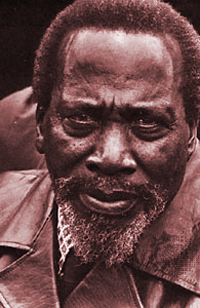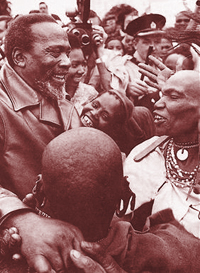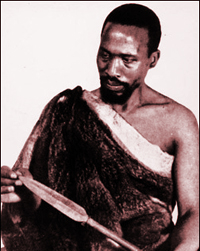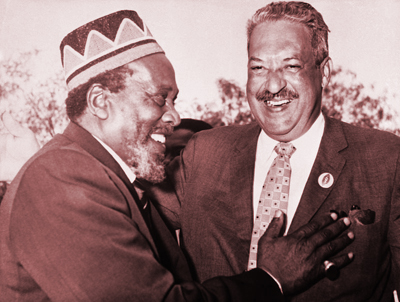
50 CENT COIN - KENYA - PRESIDENT (MZEE) JOMO KENYATTA
(KM 13)
Date: A.D. 1969
Obverse: Portrait head left - THE FIRST PRESIDENT OF KENYA - MZEE JOMO KENYATA
Reverse: Coat of Arms of Kenya: Shield and crossed speers with lions to each side - REPUBLIC OF KENYA 50 CENTS 1969
Engraver: Norman Sillman
|
Jomo Kenyatta was born in or around 1889. He was born a member of the Kikuyu tribe in what was then british controlled East Africa. He was given the first of many names he would use in his long life, Kamau wa Ngengi. As a child he assisted his grandfather who was a tribal medicine man and attended classes at a Scottish Mission at Thogoto, west of Nairobi. In 1914 He converted to Christianity and took the name John Peter. By the first world war he was working as a clerk and living with relatives among the Maasai under the name Johnston Kamau. In 1920 he married his first wife, Grace Wahu, who bore him a son, Peter Muigai, and a daughter, Margaret Wambui. He took a position in the Nairobi city council water department in 1921, a position he would hold for five years. He began his political career in 1925 as one of the leaders of the Kikuyu Central Association (KCA). In 1928 he was chosen to appear before the Hilton Young Commission in Nairobi to represent the Kikuyu people as an advocate in their land disputes. It was also in this year that he became the editor of 'Muigwithania', a newspaper dedicated to Kikuyu issues. The KCA sent him to England in 1929 to lobby on behalf of the Kikuyu and their land disputes. While there he wrote articles for British newspapers concerning these issues, the next year he took time to tour some of Europe and Russia. After returning to Africa briefly, he departed for England again to present a written petition to parliament and give a deposition to the Morris Carter Land Commission. He attended Woodbrooke Quaker College in Birmingham for a time before traveling to Moscow where he briefly studied economics. Returning to Britain he attended the University of London where he studied economics and anthropology. By 1938 he had completed his First book about Kikuyu customs entitled 'Facing Mount Kenya' which was published under his new and final name, Jomo Kenyatta. Jomo means "burning spear" and Kenyatta refers to the beaded belt, or kinyata, that he always wore. During World War II Kenyatta worked on a farm in Britain and married his second wife, Edna Clarke, who bore him a son, Peter Magana, in 1942. He continued his work as an advocate for his people and Africa in general joining with other African leaders to take part in the 5th Pan African Congress held at Manchester in 1945 where they demanded full independence for Africa. He returned to Africa in 1946 where he married his third wife, Grace Wanjiku. He served as the principal of the Kenya Teachers College and founded the Pan-African Federation along with Kwame Nkrumah who would become the first prime minister of Ghana. In 1947 he became the president of the Kenya African Union (KAU), a political party that sought to unify Kenya’s tribes. While urging his followers to act with discipline and restraint, he fought for African voting rights, the elimination of racial discrimination and the return of tribal lands. Grace Wanjiku died in 1950 giving birth to his daughter, Jane Wambui. In 1951 he married his forth and last wife, the popular Ngina Muhoho (commonly referred to as Mama Muhoho). In 1952 he was arrested for being involved in the Mau Mau Uprising, a revolt by mostly Kikuyu people who rose in armed rebellion against long simmering political, economic and racial tensions that festered under colonial rule. A state of emergency was declared and Kenyatta was indicted on the charges of "managing and being a member" of the Mau Mau Society. He was tried and sentenced to 7 years in prison with hard labor and to indefinite restrictions thereafter. Nine years after his arrest, he was freed from all restrictions. Whether he was in fact a leader of the Mau Mau Rebellion is still a matter of debate but it cannot be denied that they echoed much of his own beliefs and fought for similar goals. Without doubt the revolution caused a permanent rift and was the first real step towards independence. Kenyatta's arrest and imprisonment as a leader of this rebellion made him a martyr for the cause. He was released in 1961 and reentered society as a hero, he was voted President of the Kenya African National Union and a month later he headed a KANU delegation to London to advocate Kenyan independence. In elections held in May 1963, KANU won 83 seats out of 124, and on June 1, 1963, Kenyatta became the first Prime Minister of a self-governing Kenya. On December 12, 1964, Kenya officially became a Republic within the Commonwealth with Kenyatta as its first President. Around this time, many people began referring to him as 'Mzee' (Swahili for Elder). Kenyatta's major stated goals were unity, economic prosperity, and restitution. Looking to bring about reconciliation between tribes, and between tribal natives and white settlers, he assured white and Asian immigrants they would still be welcome in the new nation. Europeans continued to serve in his government and he sought to kept a favorable relationship with former colonial masters. Britain aided the new nation with money and support in the form of troops which remained in the country and helped the fledgling government against Somali rebels (Shiftas) in the northeast, an army mutiny in Nairobi in 1964, and a subsequent mutiny in 1971. Contrary to this, his major support was the tribal African native population, the Majority Kikuyu specifically, and they were his main concern. He initiated long over due land reform that called for a fair redistribution of lands, a life long goal of his fulfilled. He opened up trade with neighboring nations, pursued a pro-west, anti-communist policy, and oversaw Kenya's admission into the United Nations. Kenya enjoyed political stability under much of his administration which attracted foreign investments and led to economic progress as well as agricultural, industrial and educational initiatives. Highly intelligent and charismatic, he became one of the most influential political figures in Africa, one of the earliest and best-known African nationalist leaders. His tenure was not without its critics who would claim his 15 year administration was far from benevolent. Those critics argue that his land reforms left the president as the largest land owner in his nation with large parcels of land being given to his relatives and friends, referred to by some as the "Kiambu Mafia." Although in general he took a pro-west stance in foreign policy and business, he was a fierce proponent for native tribal Africans and the preservation of native African culture in his internal policy. He discouraged the use of English saying: "The basis of any independent government is a national language, and we can no longer continue aping our former colonizers ... those who feel they cannot do without English can as well pack up and go." To appeal to his native supporters, he took the egregious step taken by the dictator of Uganda, Idi Amin, and expelled all Asian immigrants from his country. Regarding his former colonial masters he is quoted as saying "When the Missionaries arrived, the Africans had the Land and the Missionaries had the Bible. They taught how to pray with our eyes closed. When we opened them, they had the land and we had the Bible." His authoritarian policies drew criticism. He exercised almost complete control over the workings of government and did not tolerate dissent. Upon his re-election in 1966 he changed the constitution to extend his already far reaching executive powers. He outlawed most opposition parties in 1969 establishing KANU as the only viable political party, essentially making Kenya a one-party state. He ran unopposed and was re-elected in 1974. He died in office on August 22 1978 in Mombassa at the age of 89. He is remembered by many as "Baba Wa Taifa" (Father of the Nation), a unifier, one of the greatest figures in African history, his tenure a Kenyan golden age. Others see him as a totalitarian dictator whose policies, in the end, caused instability and far reaching negative consequences. He was succeeded by Daniel arap Moi. His son Peter Muigai Kenyatta later became a deputy minister and his son Uhuru Kenyatta is currently an opposition leader. Jomo Kenyatta was a prolific writer authoring five books: Facing Mount Kenya (1938) , My people of Kikuyu and the life of Chief Wangombe (1944), Suffering Without Bitterness (biography 1968), Kenya: The land of conflict (1971), and The challenge of Uhuru (1971)
|




